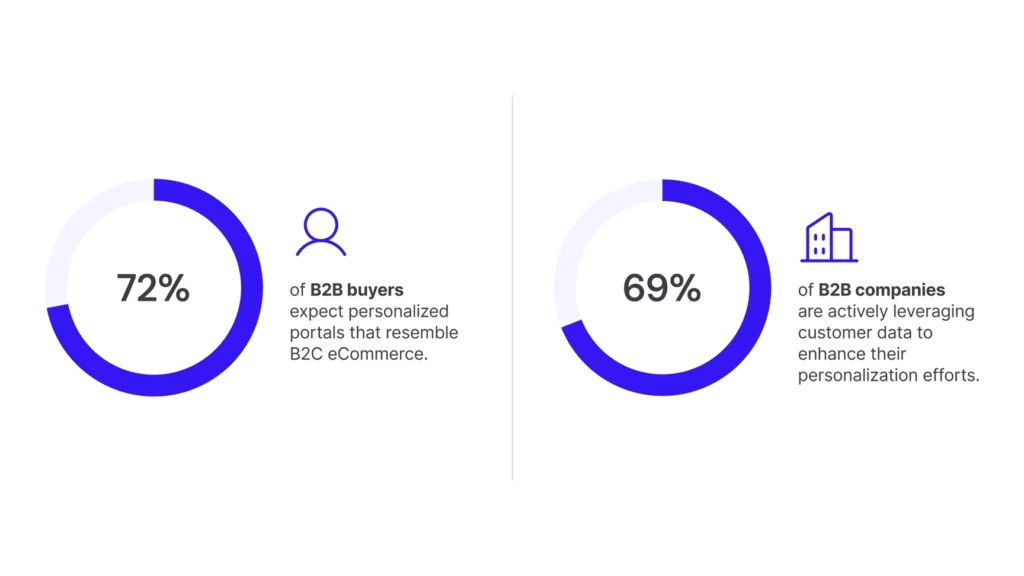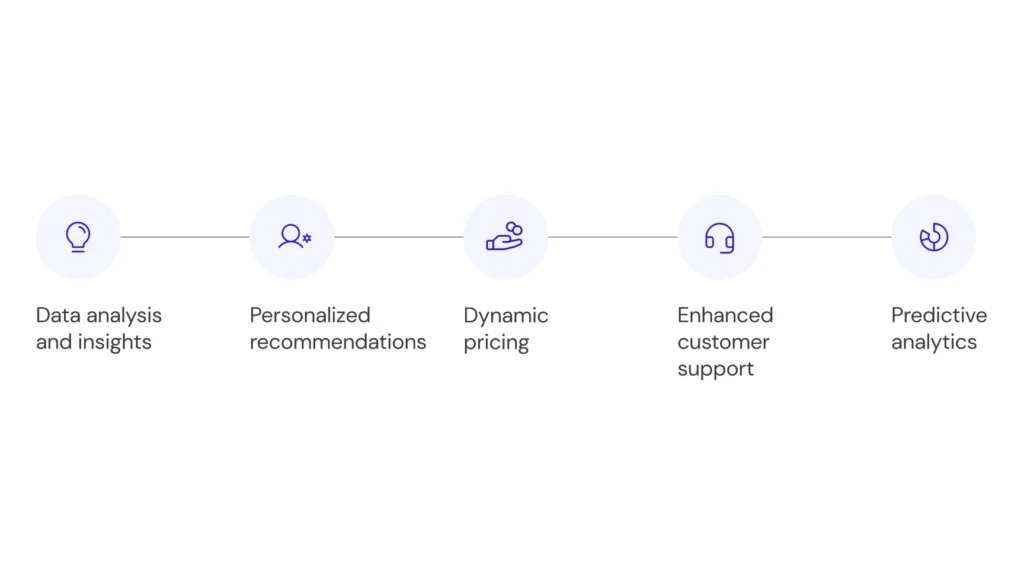B2B eCommerce personalization: Leveraging data and AI to amplify the buyer journey
Aug 13, 2024 13–16 min read

Today’s customers expect businesses to provide fast, easy, and secure online purchasing experiences—regardless of whether it’s a B2C or B2B transaction. To keep their customers satisfied and maintain a competitive edge, manufacturers and distributors are following in the footsteps of retailers like Walmart and Target by bringing the customer experience online.
With a modern, self-service B2B sales portal, you can enable buyers to create orders, configure products, make purchases, view transaction history, and more—all at their preferred time, location, and device, and without the assistance of a sales representative. However, in comparison to your standard online storefront, building and managing a B2B portal can be extra complicated, since buyers often come with very specific goals and requirements.
One of the key ingredients to a successful modernization of your B2B sales process is personalization. This means delivering tailored experiences for different types of buyers, based on client needs, market trends, data analytics, and so on. According to a recent study, 72% of B2B buyers expect personalized portals that resemble B2C eCommerce, and 69% of B2B companies are actively leveraging customer data to enhance their personalization efforts.
Let’s look at 7 areas of the customer journey where B2B eCommerce personalization can truly make a difference in terms of engagement, conversions, and sales.

Whether it be for strategic or regulatory reasons, wholesalers typically only sell certain products to certain clients. In a traditional B2B sales process, the sales rep can easily enforce the established selling rules, as they’re heavily involved in the creation and execution of each order. But to support these buyer parameters on a self-service portal, some level of personalization will be required.
When a customer is browsing your product catalog, it’s imperative that they’re only presented with items available to them. Otherwise, your portal could come off as cumbersome and unprofessional. This starts with breaking customers up into segments, establishing selling rules for each segment, then deploying intelligent software to deliver personalized product catalogs.
With an efficient system for collecting, storing, and analyzing historical sales data, you can automatically deliver personalized product recommendations.
Each time a client views a product page or makes a purchase, your portal will—in a sense—learn more about their wants and needs. So when they come back to make a new order, they are instantly presented with specific products—as well as specific product configurations—that match what they’re looking for, based on past behavior and preferences. This helps create a faster, more convenient buyer experience, leading to higher engagement and sales.
Like product availability, pricing rules for B2B sales often vary depending on the buyer. Legacy clients, for example, may get cheaper prices than newer clients, if they began doing business with the wholesaler before a new pricing model was introduced.
To accommodate personalized pricing rules, along with dynamic pricing strategies, your B2B sales portal must be supported by intelligent business logic and smooth integrations between different internal systems, like your eCommerce platform, ERP, and product information management (PIM) solution.
Personalized B2B eCommerce marketing offers significant benefits by tailoring experiences to the specific needs and preferences of individual businesses. It also builds stronger relationships and fosters loyalty by addressing unique challenges and preferences, making customers feel valued and understood.
One brand that exemplifies successful B2B personalization is HubSpot. By analyzing data from clients’ past interactions and industry-specific needs, HubSpot customizes its marketing efforts to offer tailored content and solutions. For example, a manufacturing client might receive personalized recommendations for marketing automation tools suited to their industry, while a tech company might see suggestions for advanced analytics features. This targeted approach increases the likelihood of repeat business and customer retention by delivering meaningful and timely interactions.
In many B2B scenarios, the buyer needs to know exactly how much product inventory is available, or available to promise (ATP), as this helps them with their own internal business planning. And again, meeting customer expectations is the name of the game when designing self-service sales portals. If the client has to call or email a sales rep to find this information, then the portal isn’t doing its job.
With the right systems integrations, you can display personalized ATP inventory numbers so that users know exactly what quantities they can purchase at any given time. These numbers will fluctuate depending on buyer type, market demand, and other factors.
In addition to personalized product catalogs, recommendations, and prices, B2B buyers expect personalized shipping rules to round out the eCommerce experience. If your customers regularly ship multiple items to multiple locations under a single order, then your sales portal needs to support that. This will require an efficient transfer of data from your eCommerce platform, to your ERP, to your third-party logistics provider, and any other vendors involved in the order fulfillment process.
Some customers, on the other hand, may only require basic shipping capabilities, similar to that of a traditional eCommerce storefront. With a solid personalization strategy, you can automatically display tailored shipping options, based on rules established for different B2B buyer segments.
When a client logs onto your B2B sales portal, they should be able to view previous purchases, scheduled orders, delivery status, invoices, and other information relevant to their account. This kind of personalization makes it easier for buyers to replicate past orders, stay on top of tasks, recover data for their own records, and so on.
Here, it’s important to note that all order information should be accessible inside the client’s personalized portal—even if the order was processed outside the portal, such as over the phone, in person, or by email.
The evolution of AI over the past decade has made B2B eCommerce personalization more accessible, enabling businesses to deliver highly tailored experiences and optimize interactions with clients. AI’s role in B2B eCommerce personalization encompasses various facets, each enhancing the efficiency and effectiveness of marketing strategies.

Without robust data management, a personalized buyer journey—powered by AI and ML algorithms—is unattainable. While many businesses gather an abundance of behavioral and transactional data from their eCommerce systems, fewer integrate this with back-end information like inventory levels, order statuses, pricing updates, and detailed B2B customer histories. This lack of integration prevents businesses from delivering the high-level of personalization that their customers have come to expect.
Leveraging eCommerce data across multiple sources can be challenging, as data is often dispersed across various silos and fragmented systems, making it difficult to synchronize information and create a unified view of each customer. This fragmentation hampers the ability to connect disparate data points and fully utilize them for personalization. The solution here is to build a data pipeline that can effectively consolidate, de-duplicate, and enrich data from disparate sources into one centralized repository.
Building a modern B2B sales portal—then leveraging data and AI to personalize product recommendations, pricing, inventory, shipping, and account management—requires an advanced technological ecosystem. You need custom applications and third-party integrations that help match the expectations of your customers, along with the requirements of your employees and partners. So where do you start?
Here at Codal, we design, develop, test, launch, and maintain data-driven, AI-powered, and highly personalized B2B sales portals that maximize customer engagement, conversions, and sales. Our award-winning team has years of experience helping organizations bring the B2B sales process online via modern tools and strategies that are built to scale.
For example, we deployed a sales portal for one of our clients in the fashion and decor space, where wholesale buyers can quickly and easily purchase products for their stores in bulk. And you can learn more about that project here.

Explore our latest expertise on innovation, design, and technology, or connect with us directly to see how we can help accelerate your digital transformation.